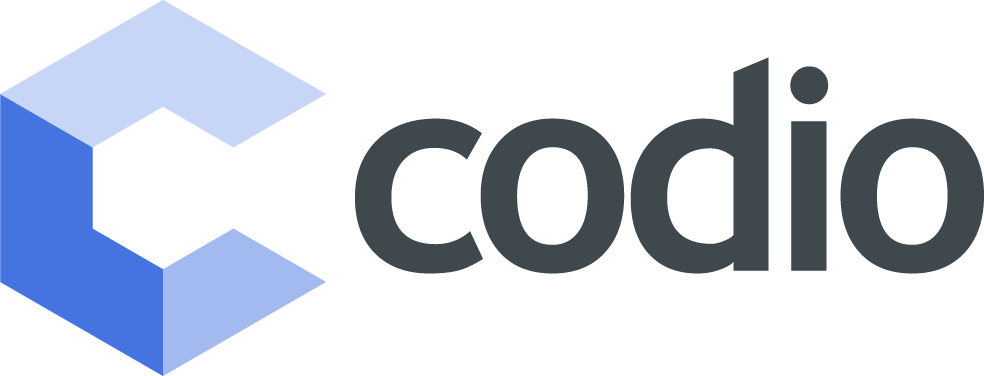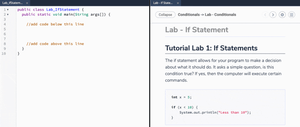We’re often asked: “what's the difference between zyBooks and Codio?”
In an attempt to differentiate, we’ve put together a comparison based on the following dimensions:
Platform
Both Codio and zyBooks offer integrated development environments (IDEs) alongside interactive, multimedia content.
zyBooks offers custom, high-production-value interactive elements and animated examples throughout the material, emphasizing "less text and more action." zyBooks include code editors and other interactive tools that engage students within the content, helping them internalize complex concepts.
As an add-on to a zyBook, instructors can enable zyLabs, a program assignment auto-grader, which provides more functionality than the standard zyBooks code editor. Instructors can create their own zyLabs to integrate with a zyBook or can use preconfigured zyLabs.
When comparing the zyBooks vs CBooks, you need to consider the user experience. Some may find the zyBooks coding environment too limiting in terms of functionality and ease of use when writing code. In response to zyBooks 2020 Student Survey, one student wrote, "I feel that with larger coding assignments, zyBooks makes life harder for me. I usually have to use an IDE just to make life easier.”
Another responded that “the textbook stuff is great, but the coding sections could be more user friendly. It’s such a hassle to write the code in [sic] the website.”
Codio uses a multi-pane approach, much like a traditional IDE. To help the code and content remain cohesive, various layouts and commands from the content pane interact with the code editing pane tie the experience together. Regardless of what your students are doing, whether highlighting or debugging code, using a code visualizer, or completing in-content assessments where the code is checked in an adjacent pane, Codio’s content centers around the code.
When it comes to user experiences, zyBooks and CBooks offer distinct levels of interactivity and ease of use.
Codio’s IDE is fully featured—initially designed for professional developers—it provides syntax highlighting and sudo terminal access, allowing you to pull in any library you want. Codio even simplifies the connection to GitHub and BitBucket so your students can quickly learn good version control habits.
Content
Both zyBooks and Codio offer a variety of STEM content, primarily focused on Computer Science courses. When considering online resources for learning, many learners find themselves comparing zyBooks vs CBooks.
zyBooks has a portfolio of course content featuring interactive exercises and animations. zyBooks are available in topics ranging from introductory programming courses in various languages to mobile app development. Instructors can mix and match zyBooks and can combine multiple “catalog zyBooks into one zyBook.” Instructors can also annotate the zyBooks with “instructor notes” and author additional sections from scratch.
Teachers can configure zyBooks into weeks, reorder the sections and chapters, remove unwanted material and mark other material as optional. However, as of May 2021, beyond authoring and adding new sections, reordering, and removing sections or chapters, it’s not possible to edit zyBooks content.
Codio has a growing resource catalog of open, editable, and interactive content that emphasizes a hands-on approach. The resource catalog contains research-backed courseware developed in-house and popular OER titles, like Think Python and Think Java, that we’ve migrated into Codio and enhanced for maximum student engagement.
All Codio Resources are entirely customizable, meaning you can edit and tweak everything from the text to example code to auto-graded assessments.
Instructors using Codio can bundle pages of content into assignments and modules that make up a course. Instructors can keep their content private or publish it publicly for other Codio instructors to use. Instructors can also choose to make their materials available for colleagues who are members of a Codio organization.
Instructors looking for seamless integration between coding and content might lean towards CBooks in the zyBooks vs CBooks comparison because of this.
When it comes to using zyBooks as a supplemental resource, it’s not actively encouraged. According to zyBooks, “You can [supplement with a zyBook], but it's unlikely to meet your objectives. It’s like dipping a toe in a pool instead of jumping in [...] plus, practically speaking, students don’t like multiple sources of the same information.”
This may be the case, but when you integrate all of your course materials and assignments within a single environment like Codio, students access the information in the same place. This level of customization is an important factor when comparing zyBooks vs CBooks. Editing, mixing, and matching or supplementing materials can help focus course material on essential points while presenting multiple explanations—the pedagogical work one would typically do during class time.
While time-consuming, this curation has clear benefits. Data from Tidewater Community College shows “greater student retention and performance when faculty members become engaged with the classroom materials.”
Codio is designed to enable instructors to meet their students where they are, which means they need flexible course materials to adjust based on their students’ needs. Often, this means they will import existing materials into Codio and supplement those with Codio Resources.
This is especially helpful for introductory computing courses without prerequisites and diverse student backgrounds as it allows instructors to pull in a range of materials from our accessible for beginners in-house content to more dense OER textbooks.
Rather than being limited to evaluating a few modules or chapters, educators can evaluate and edit Codio Resources in their entirety without restriction—Codio instructor accounts are always free, so you can be sure you’re making the right choice for your students before making a decision.
Activities and Assessments
zyBooks offers three types of activities and assessments: participation activities, challenge activities, and zyLabs. Participation activities, where “the questions' explanations are key elements, especially for wrong answers that seek to break down misconceptions,” help students check their understanding, while challenge activities are “are comparable to traditional homework.” used as homework questions. zyBooks regularly updates its activities, but instructors cannot add or edit pre-existing participation or challenge activities within a zyBook.
zyBooks also allows students to submit summative coding assignments when zyLabs are added on for an additional cost. This feature enables instructors to auto-grade based on Input/Output cases and unit testing. While this functionality saves instructors time, students have expressed frustration with zyLabs.
For instance, one survey respondent said the zyBook used “was actually just super helpful with the examples, I think there are improvements to be made, but they were much better than my other textbooks. The zyLabs were an awful part of the course tho [sic] and ended up hurting learning a lot.”
Another respondent expressed similar sentiments, specifically citing frustration with zyLab and challenge activities: “overall, the participation activities are fine. The coding portion of the assignments is awful [...] I spent more time chasing down formatting errors in lab and challenge activities than I did actually learning.”
Codio emphasizes a "learn-by-doing" approach, and supports many kinds of formative assessment types such as multiple-choice, fill-in-the-blank, and short answer. In addition, instructors can use multiple auto-graded assessment types and have a library of hundreds of editable (also auto-graded) assessments available to them, including Parsons Puzzles (drag and drop to reorder code segments), Input/Output code assessments, and advanced code assessments ranging from unit tests and style checkers to custom scripts. The video below demonstrates the hands-on student experience in Codio:
The student programs directly into the Codio IDE and “submits” code by simply clicking a button. Teachers can configure these auto-graded assessments to allow unlimited submissions, reveal or hide the correct answer upon submission, and provide feedback on the student’s solution. This steamlined approach to activities makes CBooks valuable when comparing zyBooks vs CBooks.
Student Learning Data
zyBooks allows instructors to download activity reports, including students’ information, overall score, participation score, challenge score, and individual section scores. The resulting .csv can then be uploaded into an LMS grade book or used externally from ZyBooks to run analytics on student performance.
Students using zyBooks can see their progress and performance for the entire zyBook and individual assignments and can download the data in a .csv. However, according to one student, “there is some room for improvement like some progress bars or score calculation bar.”
Codio provides a suite of tools giving instructors advanced learning insights at the class, module, assignment, and student levels. Instructors who want to dive into an individual student's work on an assignment can directly click on the assignment to be taken into that student’s project. Codio also provides a unique code playback feature allowing instructors to replay the keystrokes of a student project and see exactly how the student wrote the code.
Codio also tracks the time students spend in a given assignment—revealing how well and how efficiently students perform, enabling instructors to identify students who are cruising through the material and need challenges and students who are struggling and need support.
On the learner side, Codio’s Student Dashboard provides students with the opportunity to track their progress throughout the course. Students can see how many questions they’ve answered in an assignment, completion status, and their grade within a module. In many cases, students are presented with instantaneous feedback when they submit an assessment—getting a sense of their level of understanding before moving on to the next topic.
Price
When differentiating between zyBooks vs CBooks, the pricing is a critical factor to consider. Many wonder if zyBooks is free. zyBooks are priced on a per-title basis. According to zyBooks, “for students using a zyBook in a college or high school class, we automatically provide a discounted price, typically $58—$90 depending on what content is included (many instructors combine content, use add-ons, etc.). For non-students, most zyBooks have a regular price of about $195.”
Furthermore, access to zyBooks is restricted based on the subscription period. zyBooks says that a “zyBook's start date is set by [the] instructor, often a week or so before class starts. The end date is typically two weeks after the class ends. Subscriptions for independent learners last 6 months.” Should learners wish to extend access beyond that time period, they can pay an additional $18 per year. “Extensions are for personal use only, and not for use in any class.”
zyBooks cost can be a barrier for some, especially those looking for a more comprehensive solution. Referring to the zyBooks feature set, one student responded to zyBooks’ 2020 survey saying, "I wish for $80 there was a better coding tool with autocompletion and other features."
With Codio, teachers have unrestricted access to the Codio resource catalog. There’s no per-resource pricing or add-on costs—everything’s included in the student platform license. This makes CBooks a more attractive offer when comparing zyBooks vs CBooks.
Students can pay themselves, or the institution can purchase blocks of subscriptions that can be re-used semester to semester by different students, instead of tying a license to a student for a year when they’ll only need it for a single semester. This makes Codio very affordable on an effective per student per course or semester equivalent basis.
Furthermore, students can use any of Codio’s pre-configured stacks to create an unlimited number of personal projects.
Explore our Resource Catalog!
You can evaluate, edit, and configure any Codio Resource without restriction with a free instructor account. Create yours today.
Frequently Asked Questions
Why is zyBooks so expensive?
zyBooks is expensive because of its pricing structure. Its prices itself based on each title, however, it does offer some discounts for students. Even with this discount, the cost depends on the content learners need to access.
How does zyBooks detect cheating?
zyBooks has a simple plagiarism detection feature called the "similarity checker" that can assist in identifying any similarities among program submissions from students in a class. This feature aims to promote academic integrity by highlighting any potential similarities between assignments, ensuring fairness and the opportunity for each student to demonstrate their individual abilities.
Is zyBooks a good way to learn coding?
ZyBooks provides an interactive learning, which can be beneficial for a subject like coding that is hands-on. When it comes to learning coding, platforms like zyBooks provide immediate feedback. This real-time feedback can greatly enhance the learning experience and help you progress more quickly in your coding journey. However, other platforms like Codio offer a better learner user experience at a more affordable price.
What are the benefits of zyBooks?
zyBooks incorporates interactive activities and instant feedback into the learning process. Learners can work at their own pace, revisiting exercises when they need to. Being a digital platform has its advantages, especially when it comes to keeping up with evolving subjects in programming and coding.
Choose the Best Interactive Coding Platform
Codio provides learners with a much more user-friendly and fluid workflow to learn coding. Learning materials, content, activities, and assignments can be customized by instructors to meet their needs. Advanced tools like the code playback feature and student insights give instructors more control to help learners excel.
Schedule A Demo or Create A Free Account







